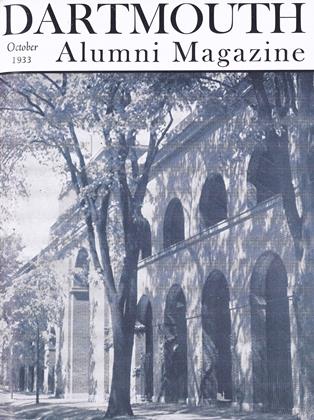FAR AHEAD of the great rumbling caravan of public opinion President Hopkins has, for years, led his students to advanced positions where, from the hills of knowledge and insight, the course of events in the valley below has been revealed to them. NRA was unborn when his prophetic words calling for cooperation as a step toward progress were addressed to attentive audiences. A powerful theme, in mounting tempo, has developed through several of his recent public addresses. Subsequent events of world significance have borne him out, to remarkable degree.
It is no accident, but rather an indication of his keen powers of observation and analysis, that a warning of what faced the country appeared in the President's opening address of a year ago: "Cooperation for the common good under intelligent leadership is the essence of social and political democracy." Again, speaking at the anniversary celebration of the Harvard Business School last April he prophesied that, in the "organization of world affairs," the willingness of people to accept petty sacrifices "might induce in mankind a forbearance which would make human brotherhood an ideal of the spirit inviting cooperation rather than a militant propaganda arousing controversy." "Education seeks to establish realization of the unity of life" said the President in his Harvard address; a major premise of his Baccalaureate address in June was the necessity for general recognition of the fact "that no man lives to himself alone."
Very recently, the 21st of last month, the theme swung upward in crescendo, in challenging phrases sensitively attuned to the spirit of the nation, but going further, still looking to days to come to achieve a better mutuality of purpose and attainment in human relations: "It is as a unit in the group that the individual of the future is to be important, and not, as in a simpler society, in his own right." Dartmouth men, and many others, to whom the President's words go from the platform of Webster Hall will hail as a culmination of intelligent leadership this paragraph of the opening address: "As in the state and in the church, so in the college, emphasis upon the formerly-held tenets ofpersonal rights and personal immunities must besubordinated to safeguarding principles deemed toaffect the general welfare at large. Let us make nomistake in faculty or student body concerning thismatter, as related to higher education. Concentration upon the advancement of the general welfareis of first importance."
Much of the address is aimed at the student body, calling upon undergraduates to throw off sophistication and immaturity. The President asks for "not so much intellectualism alone as that quality, inclusive of intellectualism, which William James has called 'tough-mindedness'." This very "toughmindedness" is born of maturity, and maturity is born of experience. Can students acquire in college the experience that forms maturity? The fact that students, by and large, are lacking in qualities of responsible thought and action indicates that much remains to be done in shaping college life and the curriculum to encourage social and intellectual growth. Such a warning, or bit of advice, as the President's, that any one undergraduate body does not represent the sum total of all learning or the whole hope for the future of civilization, may well be the entering wedge in a process of giving to students a broader experience and understanding of the world of today and tomorrow.
The door of opportunity is wide open for a college to emphasize this aspect of education. And Dartmouth has the leadership to do it.
 View Full Issue
View Full Issue
More From This Issue
-
 Article
ArticleHANOVER BROWSING
October 1933 By Rees H. Bowen -
 Article
ArticleNEW COLLEGE RESPONSIBILITIES
October 1933 By Ernest Martin Hopkins -
 Class Notes
Class NotesClass of 1930
October 1933 By Albert I. Dickerson -
 Article
ArticlePRESIDENT'S ADDRESS TO THE ALUMNI
October 1933 -
 Article
ArticleARE WE GOING TO WIN?
October 1933 By Pat Holbrook '20 -
 Class Notes
Class NotesClass of 1910
October 1933 By Harold P. Hinman
Article
-
 Article
ArticleTROPHY CUP PRESENTED BY THE CLASS OF 1894
August, 1911 -
 Article
Article639,899 Books
April 1948 -
 Article
ArticleAlumni Fund Seeks 70%
June 1955 -
 Article
ArticleBusy Days
February 1958 -
 Article
ArticleSills '42 Edits 17-Volume Social Science Encyclopedia
MAY 1968 -
 Article
ArticleWas It Medford Rum?
December 1959 By JAMES H. MOGOWAN '17

